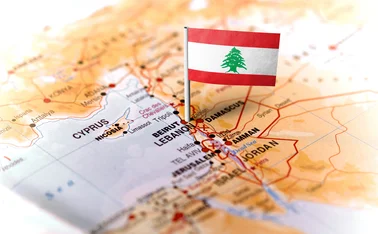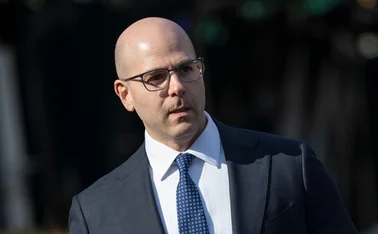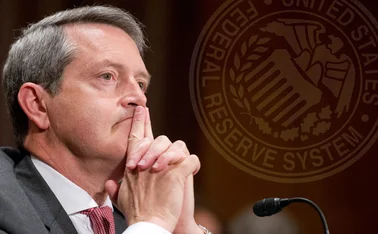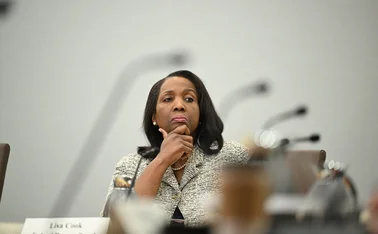
Ukrainian central bank accuses oligarch of intimidation campaign
Ihor Kolomoisky is behind “slanders” and violence “by hired thugs” over bank nationalisation, says NBU

Ukraine’s central bank has, for the first time, directly accused one of the country’s richest and most politically-influential men, Ihor Kolomoisky, of waging a campaign of intimidation against its staff.
The National Bank of Ukraine’s board said today (November 27) that it had been “been besieged by speculations and slander in the media, paid rallies in front of the NBU building, and even attempts by hired thugs to forcibly invade it”. The statement said: “We believe this pressure on the NBU comes from Ihor Kolomoisky, an oligarch and PrivatBank’s former owner.”
The board, which consists of governor Yakiv Smolii, first deputy governor Kateryna Rozhkova and four deputy governors, said Kolomoisky was waging the campaign in an attempt to overturn the December 2016 nationalisation of the country’s largest lender, PrivatBank. Kolomoisky and another Ukrainian billionaire, Gennadiy Bogolyubov, each owned close to 50% of the bank.
PrivatBank was nationalised by Ukraine’s last government, headed by president Petro Poroshenko, on the strong advice of the central bank under then-governor Valeria Gontareva. In a recent interview, she alleged to Central Banking that Kolomoisky was behind the burning of her family house in September, an armed raid on her Kyiv flat and slanderous attacks in the Ukrainian media.
The central bank has made previous statements attacking what it called a campaign against its current and former officials, without naming Kolomoisky. This new step represents a significant escalation in its response to what it calls the attacks by the former PrivatBank owner.
The NBU board repeated its earlier charges that Kolomoisky and Bogolyubov had allegedly committed financial crimes on a massive scale when they owned PrivatBank. It said Kolomoisky “owes the state $5.5 billion he siphoned off from PrivatBank before it was nationalised”.
A forensic audit of PrivatBank by US-based firm Kroll found that almost all the bank’s assets had been stolen by its owners. Gontareva said all its assets had been channelled in loans to “related parties” and then sent out of the country via financial institutions in Cyprus.
Gontareva has accused Kolomoisky of making public threats against her in his interviews. He has demanded that Gontareva return to Ukraine to testify in the cases.
She told Central Banking that her life would be in danger if she did so, but that she was happy to testify from London, where she now lives. “If something happens to me in London, I want you to know who is behind this – Kolomoisky,” she said.
The NBU statement said: “The state – the president, the government and the NBU – stand united in the call on the debtor to repay these funds.” NBU governor Smolii told Central Banking in a telephone interview earlier this month that the Ukrainian government was supporting it against the attacks.
But it is not clear that the Ukrainian state is as strongly behind the central bank as the statement says. Kolomoisky spent approximately three years outside Ukraine, but re-entered earlier this year after Poroshenko lost the presidential election to Volodymyr Zelensky. Several of Kolomoisky’s former employees work in senior roles for Zelensky, who first became famous appearing in a TV show on a channel owned by the oligarch.
Ukraine’s prime minister Oleksiy Honcharuk, who was appointed by Zelensky, met with representatives of Kolomoisky in September and said the government wanted to reach an agreement with PrivatBank’s former owners. This followed public statements by the NBU and Gontareva complaining of intimidation attempts over the nationalisation.
Gontareva told Central Banking that president Zelensky appeared to be hesitating over whether to support the NBU or Kolomoisky. She said that the president was an intelligent man who wanted to be seen as a reformer. How he acted over the PrivatBank case was a crucial test for him, she said.
International support
The NBU statement was addressed to “dear citizens and representatives of the media, the expert and business community, and international organizations!” The support of international organisations and foreign governments has been key to the NBU in its previous disputes with Kolomoisky and other politically influential figures.
Gontareva told Central Banking that Christine Lagarde, then the managing director of the International Monetary Fund, had been a key ally during the reform of Ukraine’s banks. Lagarde made several public statements saying the IMF would withdraw its crucial funding for Ukraine unless the government supported Gontareva and other economic reformers.
The ambassadors of leading Western countries, including the US, Germany, the UK, and France also made a joint public statement supporting Gontareva when political pressure on her was at its height.
Oligarch’s campaign
Kolomoisky left Ukraine before the PrivatBank nationalisation, after he had a bitter public dispute with then-president Poroshenko. The president had appointed Kolomoisky governor of one of Ukraine’s eastern regions in 2014, and allowed him to finance local militias fighting Russian-backed separatists. But locally-based journalists reported that armed men from Kolomoisky’s militias carried out raids on regulators in Kyiv in 2016, after officials had ruled against companies owned by the billionaire.
Since Kolomoisky re-entered the country, several Ukrainian lawmakers have brought unsuccessful lawsuits attempting to bar the central bank’s first deputy governor from carrying out her duties. The first deputy governor, Kateryna Rozhkova, played a leading role in the nationalisation of PrivatBank. The NBU has accused the lawmakers, and a lower court which backed one of these lawsuits, of corruption.
Kolomoisky has also brought lawsuits against the NBU over aspects of PrivatBank’s nationalisation in Ukrainian and Swiss courts.
Central Banking has asked Kolomoisky to comment on previous allegations of wrongdoing through his legal representatives, but he has not responded.
Kolomoisky and Bogolyubuov have both publicly denied all accusations of wrongdoing.
“Be careful”
Another case has also put the NBU under pressure. Ukraine’s anti-corruption police arrested former NBU first deputy governor Oleksandr Pysaruk, NBU council member Mykola Kalensky, and the central bank’s former head supervisor for the Kyiv region Alla Shulha on November 13, along with four other individuals.
All the men have been notified that they are officially under suspicion of wrongdoing in the case of a bank that received emergency liquidity from the NBU in 2014. They strongly deny the charges. The NBU has said the charges are baseless and that the arrested NBU officials or former officials are entirely honest, a statement strongly supported by Gontareva.
“Pysaruk is perhaps the most honest man and the best banker I know,” she said. Gontareva said she now regretted that she had asked him to serve as her deputy at the central bank. “In 2014, I asked him to be brave and join me there. Now, I would never say to a central banker ‘be brave’. I would tell them to be careful,” she said.
Further reading
Only users who have a paid subscription or are part of a corporate subscription are able to print or copy content.
To access these options, along with all other subscription benefits, please contact info@centralbanking.com or view our subscription options here: www.centralbanking.com/subscriptions
You are currently unable to print this content. Please contact info@centralbanking.com to find out more.
You are currently unable to copy this content. Please contact info@centralbanking.com to find out more.
Copyright Infopro Digital Limited. All rights reserved.
As outlined in our terms and conditions, https://www.infopro-digital.com/terms-and-conditions/subscriptions/ (point 2.4), printing is limited to a single copy.
If you would like to purchase additional rights please email info@centralbanking.com
Copyright Infopro Digital Limited. All rights reserved.
You may share this content using our article tools. As outlined in our terms and conditions, https://www.infopro-digital.com/terms-and-conditions/subscriptions/ (clause 2.4), an Authorised User may only make one copy of the materials for their own personal use. You must also comply with the restrictions in clause 2.5.
If you would like to purchase additional rights please email info@centralbanking.com







